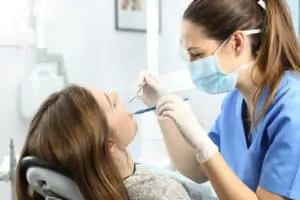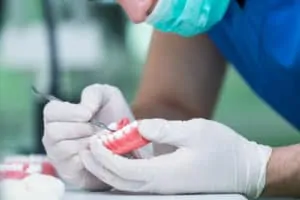Oral Health

- Don’t Chew on Anything That’s Not Food. Our teeth are meant to help us chew and digest our food. But that doesn’t mean we should chew on non-food items. Nibbling on pen caps, pencils, fingernails, or other foreign objects can increase your risk of chipping or cracking a tooth, breaking a tooth, or injuring the soft tissues in your mouth. If it’s not food, keep it out of your mouth.
- Be Careful With the Food You Chew. So, even though we talked about how your teeth are specifically designed to help us chew our food, some foods can also increase the risk of tooth damage. Be careful when snacking on popcorn, hard fruits or vegetables, and even nuts. These foods are tough to chew, and if you catch a popcorn kernel or bite into a tough nut when you’re not expecting it, you can easily crack or chip a tooth or dental restoration. Lastly, avoid crunching on ice cubes. These frozen blocks are notorious for creating chips, cracks, and fractures in teeth.
- Choose Water. Water is the best beverage to both hydrate our bodies and to keep our oral health in tip-top shape. Other beverages such as soft drinks, fruit juices, and sports drinks may seem refreshing, but they are packed with sugar and acid. These two ingredients are a particularly bad combination for your teeth as they can both contribute to decay and weakened enamel.
- Avoid Tobacco. All forms of tobacco, including cigarettes, cigars, and chewing tobacco damage teeth and can not only increase the likelihood of experiencing a dental emergency, but they can also cause long-term, serious complications to both your oral health and overall health. Tobacco users tend to be at greater risk of oral cancer, gum disease, and even tooth loss.
- Limit Your Snack Times. Snacking can be good for you, but constantly snacking can be dangerous to your oral health. When we snack multiple times throughout the day, we’re continuously introducing food particles into our mouths. Why is this concerning to your dentist in Sparks? Well, more food particles in your mouth mean more bacteria. And a constant stream of foodstuffs regularly fuels the bacteria and keeps them active. As a result, the bacteria are constantly releasing an acidic byproduct, increasing your risk of decay and cavities.
Following the tips above won’t guarantee the prevention of a dental emergency, but they can help lower the risk and keep your mouth healthy. Of course, making sure to follow a strict oral hygiene routine at home is also important to protect your smile. Brushing twice a day, floss once a day, and see your dentist in Sparks regularly.*
If you think you may have a dental emergency, call your dentist to determine the best course of action for your specific needs.
*At the time of publishing, the ADA has recommended the postponement of all preventive dental appointments. Please check your local recommendations.

Up First: The Dos
We like leading with the positive so let’s first focus on what you should do to protect your teeth during your at-home oral hygiene routine.
- Brush & Floss – The benefits of regularly brushing and flossing your teeth are undeniable, and you should continue to brush your teeth twice a day and floss once a day (even if you’re not leaving the house). Cleaning your teeth and removing debris from between them goes a long way in keeping your breath fresh and eliminating bacteria.
- Replace Your Toothbrush – Your toothbrush needs to be in good condition to do its job effectively. For this reason, your dentist in Sparks recommends replacing your toothbrush at least every 3-4 months or as soon as you notice the bristles starting to fray. You should also get a new toothbrush if you get sick.
- Store Your Toothbrush Correctly – Believe it or not, there is a right way to store your toothbrush — upright and uncovered.
- Wash Your Hands – This advice is everywhere today and one that we wholeheartedly agree with. Washing your hands several times a day helps reduce the risk of getting sick. You should also wash your hands prior to brushing your teeth or flossing.
- Disinfect Your Toothbrush – A recent study found that 0.5% hydrogen peroxide effectively reduces coronavirus infectivity. To make this solution:
- Mix 1 fl oz of 3% hydrogen peroxide with 5 fl oz of water
- Soak your toothbrush in the mixture for 10 minutes. Dump out the mixture.
- Rinse your toothbrush prior to brushing.
Now: The Don’ts
Just like there are things you should do to protect your oral health, there are also things that you should avoid if at all possible.
- Don’t Share Your Toothbrush – Your toothbrush is yours and yours alone. Don’t share it with anyone, including other family members. Doing so can easily transfer bodily fluids from you to them or from them to you.
- Don’t Allow Family Brushes to Touch – Similarly to the above, you shouldn’t allow family members’ toothbrushes to touch while being stored. Make sure they’re kept a few inches away from each other.
- Don’t Bite Your Nails – Millions of Americans bite their nails, but now may be a good time to work on breaking that habit. Not only does nail biting easily spread bacteria from whatever may be lurking under our fingernails to our mouths, but it can also damage teeth.
As of the publishing date, the American Dental Association (ADA) has recommended the postponement of any preventive or routine dental care for three weeks. During this time, your dentist in Sparks wants to encourage you to do everything you can to take care of your smile, including following the tips above. Stay healthy, and we hope to see you soon.

Isn’t Brushing & Flossing Enough?
Even if you practice a great oral hygiene routine in the comfort of your home by brushing twice a day and flossing once a day, you may not be fully protecting yourself against some of the dangers lurking in our mouths. Professional dental cleanings and comprehensive checkups can catch potential problems early and do wonders in keeping both your mouth and your body healthy.
Dental X-Rays
One of the things you’ll usually experience at one of your bi-annual dental visits is having x-rays taken. These often digital photos allow your dentist in Sparks to take a peek under the surface of your teeth and gums to get a full picture of what’s going on in your mouth. Images created from x-rays can allow your dental team to catch any decay that may not yet be visible to the naked eye. When decay is caught early, it’s treated easily and protects you against the need for advanced dental treatment such as root canals or even tooth loss. X-rays can even help diagnose an abscess (infection). If not treated, a dental abscess can affect overall health and lead to:
- Tooth loss
- Sinus infection
- Bacterial endocarditis (when the infection makes its way to the heart)
- Infection in the face and jaw which can restrict the airway (Ludwig’s angina)
Oral & Overall Health
As we’ve mentioned before, there is a strong connection between oral health and overall health. For example, gum disease can potentially be a serious infection that can easily contribute to health problems outside of the mouth. If not treated promptly and it’s allowed to progress, gum disease puts patients at an increased risk of heart disease, respiratory disease, and diabetes.
But that’s not all. Many whole-body diseases may first show signs in the mouth including diabetes, kidney disease, certain cancers, and heart disease. The sooner these health concerns are diagnosed, the more successful treatment tends to be. This is one reason you should see your dentist in Sparks every six months.
Your dentist will usually recommend that you schedule and complete an appointment twice a year. However, if you’re at higher risk for some of the problems listed above you may be asked to be seen more often. These preventive appointments can go a long way in not only protecting your smile and oral health but your overall, whole-body health as well.
If you’ve been putting off your dental checkup and cleaning, call to schedule an appointment today.

Simplifying Nutrition
The truth is, eating right doesn’t sound too difficult. But fully understanding nutrition and those crazy nutrition labels can be confusing. The basics are, well, basic — don’t eat too much sugar, avoid indulging in fast food, eat more vegetables, etc. However, truly fueling your body with what it needs to perform at its best is complicated. In fact, even the Food Guide Pyramid from the United States Department of Agriculture (USDA) has changed twice since it was created in 1992. And the current MyPlate dietary guidelines are individualized based on age, gender, height, weight, and daily activity level. Essentially, what’s right for one person may not be right for another. No wonder we’re all confused! The best way to find out the best dietary recommendations for you is to check out the MyPlate checklist to find your ideal combination of:
- Fruits
- Vegetables
- Whole Grains
- Lean Proteins
- Dairy
Nutrition & Oral Health
We know that eating a healthy, well-balanced diet can certainly benefit our bodies and help keep us healthy. The same is true for your oral health. Sugary foods, carbs, and acidic foods and drinks can definitely put teeth at risk for decreased enamel protection and, as a result, more susceptible to decay and cavities. Try your best to avoid those foods in high quantities. Instead, choose some of the best foods for your smile (and your body) including:
- Cheese
- Fatty Fish
- Eggs
- Raw Veggies – especially the crunchy ones!
- Water
More on Sugar
It’s no secret that your dentist in Sparks really, really doesn’t like sugar. This is because sugar is one of the top contributors to decay. When we eat sugary foods, the bacteria in our mouths feed on the sugar and release an acidic byproduct. This acid attacks tooth enamel, weakening it, which makes it easier for bacteria to find its way into teeth’s tiny nooks and crannies. The result? Decay, cavities, and the need for dental treatment such as fillings or even a root canal. Reduced tooth enamel can also make teeth very sensitive to hot or cold or change the color from bright white to a dull, darker appearance.
However, sweet treats aren’t the only snacks that are packed with sugars. In fact, there are foods out there that don’t even taste sweet but have the same effect. Carbohydrates have something called the hidden sugar effect. As we eat them, carbs break down into simple sugars, and we know what happens in our mouth when we give the bacteria sugar. So even if you don’t have a traditional sweet tooth, check out the nutrition labels and try to limit not only foods with high sugar content but also those with a lot of carbs.
Choosing healthier meals and snacks for you and your family can help you all live a healthy life. Eating foods that are good for your body can also protect your teeth from the damaging effects of sugar and acid. Try to pick foods that are good for you overall. Your body, your smile, your dentist in Sparks will thank you for it.

The Fascinating Tongue
Our tongues may not seem that fascinating, but to your dentist in Sparks, these muscles are actually quite interesting and important. Not only are our tongues one of the strongest muscles in our bodies, but they also help us do many useful, everyday tasks such as speak, chew, and swallow. Tongues also have about 10,000 taste buds that allow us to taste every bit of our favorite foods. But these taste buds are also really great places for bacteria to hide. If those bacteria are not removed regularly, they can start to negatively affect oral health.
What Happens if You Don’t Brush Your Tongue?
Our tongues are made up of tons of tiny bumps called papillae. These papillae create peaks and valleys on our tongues and give bacteria the perfect place to settle. If the bacteria aren’t removed, you may experience some unwanted side effects. Let’s take a look at a few.
- Bad Breath – One of the most common side effects of not brushing your tongue is bad breath. While bad breath can be caused by a lot of different things, an unclean tongue can be to blame.
- Decreased Sense of Taste – Everyone loves to eat their favorite foods because they taste good. But when a tongue is not properly cared for, bacteria can coat our taste buds and decrease our sense of taste. This means that our favorite foods may not taste quite as good as they once did.
- Black, Hairy Tongue – Even though this sounds scary and gross, black, hairy tongue is a very real thing that can occur from not brushing your tongue. This discoloration happens when food and drink particles aren’t removed from the surface of the tongue and essentially stain those tiny papillae. It should go away on its own once you get into the tongue-brushing habit.
- Gum Disease – Since our tongues are in contact with our teeth throughout the day, everything on our tongues can easily transfer onto our teeth. When tongue bacteria move to the teeth, it can cause decay and, if left untreated, progress into gum disease. Gum disease is a serious oral health condition that can cause tooth loss if not treated.
How Do You Clean Your Tongue?
It’s important to brush your tongue every time you brush your teeth. This will give you the cleanest mouth. You don’t need to scrub your tongue hard, and truth be told you shouldn’t. A gentle brushing from the back of the tongue to the front and from side-to-side will do just fine. However, patients with a strong gag reflex may have trouble with this method. If this is the case, try using a tongue scraper that you can buy at any pharmacy. It’s just as effective as brushing but may not trigger the gag reflex as much as a toothbrush.
Brushing your tongue is a crucial step in making sure you’re caring for your overall oral health as well as possible. Of course, seeing your dentist in Sparks at least every six months is also necessary.

Determine What You Want
Before you or your dentist will know whether cosmetic dentistry will give you the smile you want, you need to know what it is you’re trying to achieve. The more specific you can be about what you don’t like about your smile as well as what you wish was different, the more you’ll know about whether or not cosmetic dentistry is the right solution for you. Take these questions into consideration:
- Do I wish my teeth were whiter?
- Do I want a straighter, more even smile?
- Does this minor chip in my front tooth really bother me? Would I feel better if it was fixed?
Find the Best Cosmetic Dentist for You
Once you’ve narrowed down your list of desires, the fun part of finding the best dentist for you can begin. Although it may seem like a daunting task, it really doesn’t have to be. Check-in with family and friends to see if they have any recommendations or head online to search for local cosmetic dentists in your area. Read reviews, check out websites, and look at before and after photos. After you’ve decided on a dentist, schedule a consultation.
Know What Cosmetic Dentistry Treatments Are Out There
There are several treatments that all fall under the category of cosmetic dentistry, but not all of them are right for every situation. Let’s check out a few common treatments.
- Teeth Whitening – If you want to take your teeth from dull and discolored to bright and white, you may want to consider a professional smile whitening treatment. Whitening that’s done by your dentist in Sparks can boost your teeth up to several shades brighter in just one visit.
- Veneers – Like teeth whitening, veneers can help brighten the appearance of dull, discolored teeth that don’t respond to bleaching. Veneers essentially cover up the front surface of teeth with a thin piece of porcelain. They’re custom created in shape and color for a natural look so nobody will even know they’re there.
- Bonding – Dental bonding is another option that can correct discoloration but it can also fix minor chips, cracks, or gaps for a more even smile. The process involves both science and art to create a natural appearance but the results can transform a smile.
Nobody should have to live with a smile they’re unhappy with. Luckily, we have cosmetic dentistry to help. If you’re considering cosmetic dentistry, make a list of what you’d like to change, research cosmetic dentists in Sparks, and become familiar with which treatments can help you get the look you want. Finally, make the move and schedule a consultation. Your journey to a new smile is only a phone call away.

What is Tongue Positioning?
Tongue positioning and tongue posture are interchangeable terms used to describe the positioning of our tongues while at rest. Even though this may sound silly, there is such a thing as good tongue positioning and bad tongue positioning, and the truth is, bad tongue positioning can affect oral health as well as other parts of the body.
Why is Bad Tongue Positioning Bad?
Do you remember the song that goes, “the leg bone is connected to the knee bone?” Well, our tongues are kind of like that. You see, tongues are super strong muscles that impact several areas of our bodies, including our mouths, eyes, noses, heads, necks, and shoulders. Knowing this, it probably comes as no surprise that if we don’t have proper tongue positioning, it can cause trouble in these other areas of our bodies. Improper tongue posture can contribute or lead to:
- Sleep Apnea
- TMJ
- Problems with Vision
- Bad Body Posture
- Tooth Damage
What is Proper Tongue Positioning?
So, what exactly is proper tongue positioning? Simply put, proper tongue positioning occurs when someone gently rests their tongue on the roof of the mouth and away from the teeth. During rest, the lips should also be closed, and the teeth slightly parted. Practicing proper tongue positioning can help protect teeth from shifting and can improve sleep, decrease neck and jaw pain, and reduce the number or intensity of headaches.
What is Bad Tongue Positioning?
Your dentist in Sparks will tell you that if you rest your tongue on the bottom of your mouth or up against your teeth that you have bad tongue positioning. Besides the concerns listed above, putting repeated pressure on the back of teeth can cause them to shift, become crowded, or even result in tooth grinding and decay. Additionally, resting your tongue on the bottom of your mouth can cause increased neck pain, jaw pain, and even change the way someone looks. Go ahead and try something for us. Rest your tongue up on the roof of your mouth, then move it down to the bottom of the mouth. You should notice an obvious shift in your chin, neck, and head. Now, if the tongue is rested on the lower mouth over several years, it can create a longer, flatter face shape or cause the chin or forehead to jut forward permanently.
How to Fix Bad Tongue Positioning
The good news is you can work to improve your resting tongue positioning by first becoming more aware of where your tongue falls at rest. If you notice that your tongue is falling to the bottom of the mouth or is pushing up against your teeth, focus on consciously changing its position. Keep in mind, permanently changing your tongue positioning can take time and practice, so be patient.
Of course, if you have concerns about your tongue positioning and how it may be affecting your oral and overall health, talk with your dentist in Sparks.
Almost all of us have experienced the annoyance and pain associated with tooth sensitivity. In fact, the Academy of General Dentistry estimates that 40 million American adults have sensitive teeth. That’s quite a lot of people who suffer from those unexpected zings of nerve pain every day. So many, in fact, that your dentist in Sparks wants to talk all about sensitive teeth in this week’s blog.
Top Causes of Tooth Sensitivity
What exactly is going on when our teeth feel sensitive? Tooth sensitivity is ultimately caused by enamel erosion, which can leave the inner workings of the teeth, including the nerves, exposed to the elements. However, there are a variety of things that can cause enamel erosion, which makes each situation of sensitive teeth unique to the individual. Let’s take a look at some of the top causes of enamel erosion and, therefore, sensitivity.
Brushing Too Hard – Even though it’s important to brush your teeth thoroughly twice a day, it’s equally important to do so properly. Many patients think that the harder they brush the cleaner their teeth will get. But that’s just not the case. Scrubbing too hard can damage that important protective layer of enamel and cause sensitivity.
Grinding Your Teeth – Similarly to brushing too hard, grinding your teeth puts a lot of pressure on the enamel and can easily wear it away. Tooth grinding can also cause chips or cracks to occur which can also increase the likelihood of someone experiencing sensitive teeth.
Gum Disease – A lot, if not most, tooth sensitivity starts and occurs at the gum line. When plaque buildup is not removed and good oral hygiene is not maintained, bacteria get up under the gums which, if not treated, will lead to gum disease. Gum disease can most definitely cause sensitivity and other problems.
How to Treat Tooth Sensitivity
It’s important to note that sensitive teeth aren’t something you should treat at home long term. You should schedule an appointment with your dentist in Sparks to find the best treatment for your sensitive teeth. However, there are things you can do to help reduce sensitivity or avoid it in the first place.
Easy on the Hot and Cold Foods
Many times tooth sensitivity is made worse when exposed to hot or cold foods or drinks. We encourage you to try to avoid foods or drinks at these extreme temperatures to help keep sensitivity at bay. Also, another surprising culprit is acidic foods and drinks. Enjoy these in moderation and avoid them if you find they make your sensitivity worse.
Brush With a Soft-Bristled Toothbrush
Everyone should be using a soft-bristled toothbrush to brush their teeth as they’re easier on tooth enamel. Stiffer bristles can easily damage enamel and contribute to sensitivity.
Pick Toothpaste for Sensitivity
Consider switching your toothpaste to one specially formulated for sensitive teeth. Be sure to look for one that has the American Dental Association Seal of Acceptance. This means the product has been tested and its advertising claims validated.
Tooth sensitivity is nothing to take lightly, and nobody should have to live with the surprising zaps of pain or avoid their favorite foods long-term. If you have sensitive teeth, call your dentist in Sparks to schedule an appointment today.
Re-posted with the permission of Perio Protect.

Alzheimer’s disease (AD) is marked by a sticky compound that accumulates in the brain called “beta-amyloid.” Many scientists believe that build-up of this substance interferes with brain function, eventually killing neurons and brain cells permanently.
Researchers are studying the associations between oral bacteria, inflammation and the formation of beta amyloid. They are trying to determine if people with severe gum disease are more likely to develop Alzheimer’s disease. And another study showed that people who already had AD experienced a six fold increase in cognitive decline when they had periodontal disease. The oral bacteria in unhealthy gums causes inflammation that may contribute to arterial and cognitive decline.
This isn’t to say that periodontal disease causes dementia and Alzheimer’s disease, but that health gums contribute to healthy brains. For good mental health, you should also maintain a healthy weight, keep cholesterol, blood sugar and high blood pressure in check, avoid nicotine, stay active, treat depression, eat a healthy diet, and stay socially engaged.
But studies show that your oral health plays a significant role as well. That’s where we can help.
We prescribe Perio Protect to help treat periodontal disease, with results reducing infection and inflammation in as little as three weeks. The easy-to-use, at-home Perio Trays® comfortably deliver hydrogen peroxide deep below the gum line. It’s easy, effective, and can help keep you in better overall health. Both today and down the road.
In addition to regular trips to your dentist to keep your teeth and gums free of disease, you should always consult your primary care physician for matters of overall health and have regular physical exams. Especially if you have a family history of dementia.

How to Properly Care for Dentures
Even though dentures are not natural teeth, that doesn’t mean they don’t still need a little TLC in order to keep them clean and fitting comfortably.
- Use Care When Handling. Dentures can be pretty fragile, so the first step to caring for them is to make sure you use care when handling them and cleaning them. Also, make sure to store your dentures in a safe place where they won’t easily get knocked on the floor. Being gentle with your dentures can reduce the risk of damage or the need for repairs.
- Rinse Them After Eating. Remove your dentures and thoroughly rinse them following every meal to remove any loose food particles. If leftover food is left lingering around it can contribute to bad breath and even gum disease.
- Brush Your Dentures & Your Mouth. It’s important to brush both your dentures and your mouth at least once daily to remove any bacteria buildup. Use a soft-bristled toothbrush and a denture cleaner to thoroughly cleanse your denture and remove any excess adhesive. As for your mouth, also use a soft-bristled brush to gently scrub any natural teeth and your tongue.
- Soak Your Dentures Every Night. In order to keep their shape and comfortably fit your mouth, dentures need to stay moist. After you remove your dentures and clean them at night, place them in a glass of water with a denture solution to soak. Your dentist in Sparks will be able to recommend a solution that’s best for you.
- Rinse Again in the Morning. You should thoroughly rinse your dentures before putting them back in your mouth after soaking, especially if you use a denture-soaking solution. While these solutions are good for denture care, they can lead to illness or burns if not rinsed off of a denture before it’s reinserted.
- See Your Dentist in Sparks. Seeing your dentist as often as recommended is key to keeping your dentures fitting well. Your dental team may also professionally clean your dentures for an ultra-thorough clean.
Dentures are an investment in your smile, and you want to take proper care of them so they last a long time and the rest of your mouth stays healthy. If dentures aren’t cared for properly, plaque can build up and cause additional tooth loss, bad breath, and even gum disease.
If you’re missing some teeth and think dentures may be right for you, call our dental office in Sparks to schedule a consultation. We’ll work with you to find the best tooth replacement option for you.

